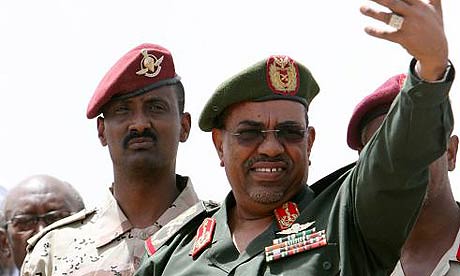
President Omar al-Bashir of Sudan has been targeted by the Western imperialist countries over the conflict in the Darfur region. The oil magnates, who dictate US policy, want to seize the petroleum resources and deny the right of self-determination., a photo by Pan-African News Wire File Photos on Flickr.
Sudan rebels claim they killed 130 army members
Feb 28, 2012
Juba: Rebel groups in Sudan said on Monday they had captured a Sudanese army garrison near the border with South Sudan in an operation that Khartoum blamed on the south’s army.
The rebels said in a statement they killed 130 members of the government forces in the attack. The figure could not be independently verified.
The South Sudan government said none of its forces were involved, but the assault fuelled tensions between the neighbours already at odds over oil exports and border disputes. Any involvement of southern forces would have violated a non-aggression pact signed by the two sides this month.
A helicopter crash is seen in Al-Faw, an area of Sudan's Gedaref state. Reuters
The clashes on Sunday took place in the South Kordofan province on Sudan’s side of the ill-defined border with South Sudan, a flashpoint between the two countries.
The newly formed rebel umbrella group Sudan Revolutionary Front (SRF) said its forces were behind the assault on the military post around Lake Obyad, which lies near the boundary.
The SRF was formed last year between the Sudan People’s Liberation Movement-North (SPLM-N), who operate in South Kordofan and Blue Nile states, and the Justice and Equality Movement (JEM), based in Darfur in the west of Sudan.
“It is a victory, the first victory under the umbrella of the SRF to have two forces fighting together,” SRF spokesman Arnu Ngutulu Lodi told Reuters by telephone.
The SPLM-N’s fighters fought alongside the forces of what is now the south’s ruling SPLM during Sudan’s civil war that ended with a peace deal in 2005 and led to southern secession in 2011.
The SPLM-N says it cut ties with the South after independence, but Khartoum accuses Juba of continuing to provide military and financial support to the rebels.
According to Lodi, the SRF captured hundreds of machine guns, dozens of heavy artillery and 200 vehicles from the Sudanese Armed Forces (SAF), although he said it was too early to provide a number of casualties from either side.
Both countries trade accusations of supporting insurgents in each other’s territory. Tensions have also mounted in a dispute over how much Juba should pay Khartoum to export its oil.
Authorities in landlocked South Sudan say Sudan has since December stolen over $800 million worth of oil, which has to be exported via a pipeline through the north. Sudan says it seized the crude in lieu of what it calls unpaid transportation fees.
Sudan has threatened to file a complaint about what it says are the south’s violations of the non-aggression pact to the United Nations Security Council and the African Union, although the South said its forces were not involved.
“Those battles that have been fought for the last 72 hours are completely within the republic of Sudan and are between SAF and (SRF) and we are not party to that,” South Sudan’s army spokesman Philip Aguer said.
In turn, he said Khartoum violated the pact by bombing the South’s army at Jau the day after the security deal was signed. That is a charge that Sudan has denied.
“It is the government of South Sudan that should complain to international bodies like the Security Council,” Aguer said.
The United States has warned that South Kordofan could face famine conditions if Khartoum continues to deny aid agencies access to civilians in rebel-held areas.
Reuters
No comments:
Post a Comment